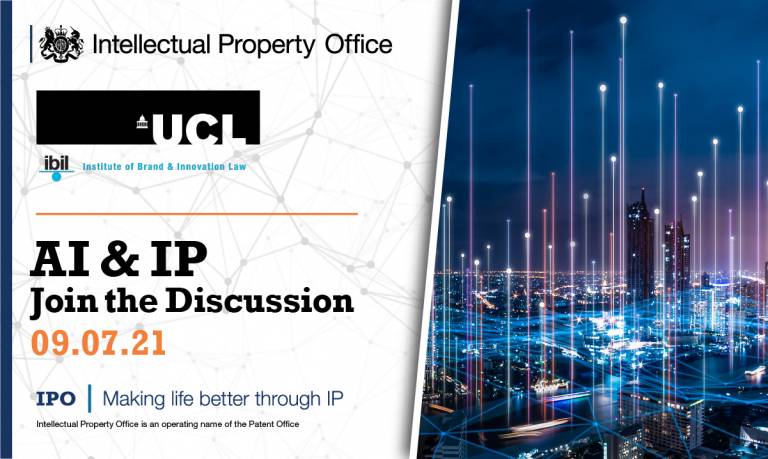AI and Copyright: What Next?
09 July 2021, 10:30 am–12:00 pm

A joint event with the UK Intellectual Property Office and UCL's Institute of Brand & Innovation Law (IBIL)
Event Information
Open to
- All
Organiser
-
UCL Laws Events
The Panel
Chair: Professor Sir Christopher Floyd, Honorary Professor UCL Faculty of Laws, Former Lord Justice of Appeal, England & Wales.
Speakers
- Margaret Haig, Head of Copyright Operations, UK Intellectual Property Office
- Alexandra Condon, Head of Public Affairs, PRS for Music
- Tobias Mckenney, Copyright Counsel, Google
- Professor Dr Martin Senftleben, Faculty of Law, University of Amsterdam
About the event
On 23 March 2021, the UK Intellectual Property Office (IPO) published the outcome of its consultation on artificial intelligence (AI) and intellectual property (IP) (the Response). The Response underlines the UK government’s aim to create an environment which places the UK ‘at the forefront of the AI and data revolution’.
In respect of copyright and related rights, the Response considers the many submissions received from copyright owners, the creative and technology industries, licensing bodies, legal representatives, and academics. Two key themes emerge where there was no general consensus:
- Whether copyright should protect works created by AI.
- How best to regulate use of copyright works as training data for AI systems.
Most respondents considered that human creators should be ‘put first’ over works created by AI technology, but while some argued that AI-generated works should receive no protection at all, others suggestion by a separate right with lesser duration and scope. Respondents also emphasised that text and data mining (TDM), an activity vital in training AI technology, might currently constitute copyright infringement. Should the current copyright exception permitting TDM for non-commercial scientific research be extended to cover commercial uses? Or would a licensing scheme of works used in TDM result in a fairer scope of protection for creators? Others called for clarity regarding liability for copyright infringement, since AI processes typically involve a number of actors, each playing different roles.
The Response acknowledges that the AI revolution requires existing copyright legislation to be reviewed and revised if it is not fit for purpose. The European Commission is also considering the impacts of AI on IP and on society more widely. We will watch how their thinking develops with interest.
Watch the recording
 Close
Close

